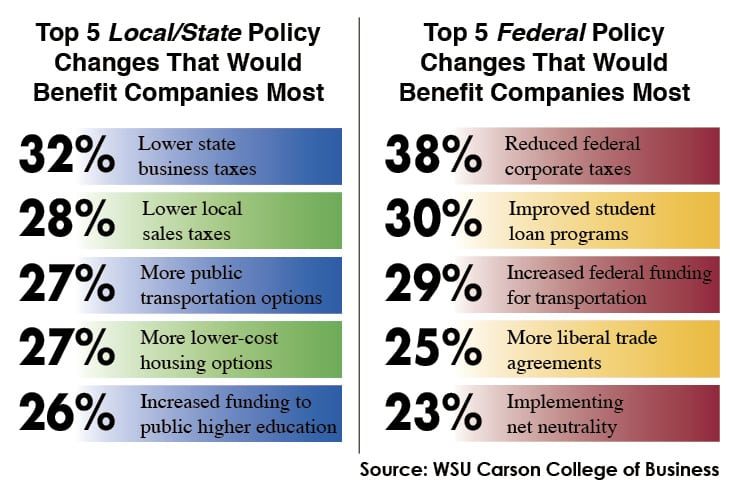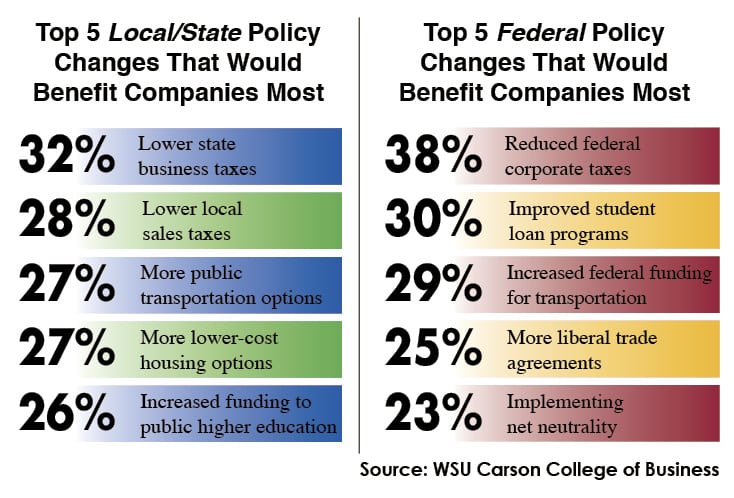
Home » Study: Northwest business leaders optimistic but worried about future
Study: Northwest business leaders optimistic but worried about future

August 14, 2018
The state’s business leaders feel the region is poised to take advantage of positive factors fueling the strong economic, such as income stability and job growth.
That’s according to a recent study from Washington State University’s Carson College of Business.
Despite the optimism, many of the surveyed business leaders say they are uncertain about the future growth potential of business in the region.
The report said it is clear businesses must consider ways to mitigate factors perceived to be hurting the community, including traffic congestion and job loss due to automation.
Of the Washington business leaders surveyed:
- 48 percent feel the business climate has been strengthening steadily.
- 82 percent feel the business climate in the Northwest is changing in a good way.
- 43 percent are worried about the growth potential of business in the Northwest.
- 32 percent are worried their company may have to downsize in the next year.
The college surveyed 1,000 business leaders in Washington, Oregon, Western Montana, Idaho, Northern California and Vancouver, B.C., who hold upper management level positions, have decision-making or hiring responsibilities at their company and have three years of management experience.
“As I looked through the findings from this year’s survey, I was struck by this question: Who is responsible for strengthening our communities, for creating opportunities, for sustaining our environment? I was heartened to see that our business community believes that we are all responsible. We can work collaboratively to solve these issues, and we need to do that. Business, government and nonprofits need to find ways to work together to address these issues—large and small,” said Larry “Chip” Hunter, dean of the Carson College of Business, in the report.
 While business leaders generally see their company as a positive force, they also recognize their impact has been detrimental in other areas, including job loss to automation, traffic congestion and housing affordability. Despite this, most surveyed said the government should be responsible for providing solutions.
While business leaders generally see their company as a positive force, they also recognize their impact has been detrimental in other areas, including job loss to automation, traffic congestion and housing affordability. Despite this, most surveyed said the government should be responsible for providing solutions.
In addition to helping solve community issues, government is seen as playing a key role in driving business success. Seventy-five percent of business leaders report federal and state policies have the biggest impact on the success of their company, compared to local and global legislation.
When it comes to federal government support, business leaders say reduced corporate taxes would benefit their company most (38 percent), followed by improved student loan programs (30 percent) and increased funding for transportation improvements (29 percent).
The report also indicated that businesses have trouble finding and retaining talent.
Seventy-two percent of business leaders say their company is in a position to create more jobs, but 60 percent are struggling to find qualified undergraduates from area universities when hiring.
Beyond offering competitive salaries to reduce employee turnover, business leaders show a clear gap between what they think employees need and what their companies currently offer to help retain talent, according to the report.
For example, 58 percent of business leaders think employees want a flexible work schedule over a higher salary, but only 28 percent provide flexible or remote work opportunities.
Across the Northwest, awareness and appreciation are growing for corporate social responsibility, or CSR, programs, with 57 percent of business leaders reporting their company currently has CSR programs.
Mid-size companies (250 to 999 employees) and large companies (1,000+ employees) are most likely to have such programs (74 percent and 64 percent, respectively), according to the survey.
But small businesses are stepping up, too, with one-third of small businesses in the region reporting they have a formal program and most actively support a relevant issue or community organization.
The top five actions that business leaders are considering to maintain their reputations are:
- No tolerance sexual harassment in the workplace.
- Understand and support the values of their customers.
- Implement more livable wage increases.
- Promote retraining or new job opportunities for displaced workers due to technological advances.
- Implement customer loyalty programs.
The survey found that most business leaders view the Northwest as a leader in innovation compared to the rest of the United States, but they don’t necessarily see it as a flagship for technology-based offerings.
When given a range of options, more than a third of business leaders felt the “next big things” the Northwest will be known for are marijuana products and merchandise — the most selected response — followed by those who feel the region will be known for being a good place to raise a family.
Local News
KEYWORDS august 2018





